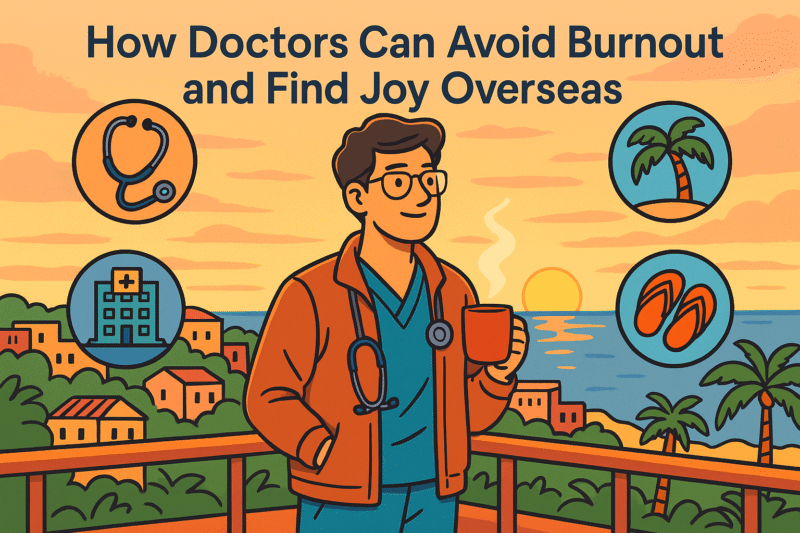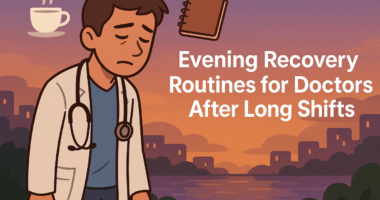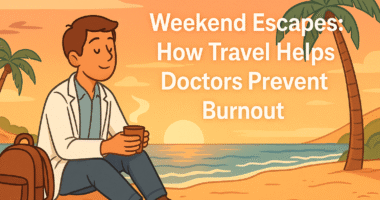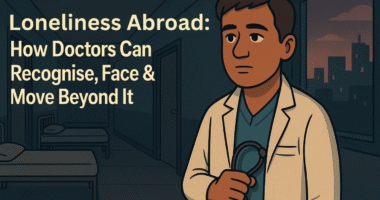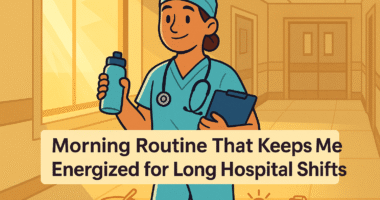The Emotional Toll of Being a Foreign Doctor
When I first moved abroad, I thought adjusting to new hospital systems would be the hardest part. But what truly tested me wasn’t the medical work—it was the constant emotional balancing act leading to burnout.
Every shift demanded more than just clinical skill: cultural adjustments, language barriers, loneliness, and the quiet exhaustion that builds when you don’t have your usual support system nearby.
Many doctors underestimate how this invisible weight adds up. We tend to push through, telling ourselves, “I’ll rest on my next off day.” But in reality, rest rarely comes unless we deliberately make space for it.
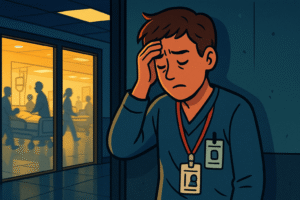
Why Doctors Abroad Burnout Faster
Working overseas intensifies everything.
You’re not only a doctor—you’re an immigrant, an interpreter, and sometimes your own emotional support system.
Unlike your home country, you might not have easy access to your family doctor, therapist, or even your closest friends. It’s a perfect storm for doctor burnout.
According to the World Health Organization and the Centers for Disease Control and Prevention (CDC), healthcare worker burnout rates have risen significantly since the pandemic, with foreign doctors among the most at-risk groups.
Common signs include emotional exhaustion, reduced empathy, and a growing sense of detachment from your work.
When you’re abroad, this happens faster—especially when you’re trying to prove your competence in a new system. You skip breaks, stay late, and say yes to extra shifts, hoping it’ll help you “fit in.” But that habit quietly drains you.
My Night Shift Lesson on Work-Life Balance
I learned my hardest lesson during a string of back-to-back night shifts in my first hospital abroad.
At first, I treated my off days like recovery marathons—sleeping late, scrolling endlessly, and calling that “rest.”
But one night, halfway through a shift, I realized I was running on autopilot. My empathy had dulled. I was treating patients efficiently—but not warmly.
That was the wake-up call.
From then on, I built small rituals into my routine:
-
Five-minute resets during shifts—just stepping outside the ward for deep breaths.
-
Short daily reflections before bed—writing one thing that went well, no matter how small.
-
Early-morning walks after night duty instead of heading straight to bed—letting my mind decompress before the blackout curtains came down.
These weren’t grand lifestyle changes, but they reminded me that recovery isn’t optional. It’s maintenance for the soul.
How to Build Daily Recovery Routines
You don’t need a perfect schedule to protect your mental health overseas—you just need consistent micro-moments of balance.
1. Simple grounding habits
Even on the busiest days:
-
Call home once or twice a week, not just to update your family, but to feel anchored.
-
Take short park walks after shifts. Natural light and movement regulate your circadian rhythm and mood.
-
Journal for five minutes before sleep—write what you’re grateful for, or what lesson the day taught you.
Research from Harvard Health Publishing shows that even 10 minutes of mindfulness a day can lower stress hormones and improve sleep quality.
2. Protecting rest as sacred time
Doctors abroad often feel guilty resting, as if time off means lost productivity. But true work-life balance for doctors abroad means realizing rest makes you better at your job.
Use small signals to separate work and rest:
Change clothes immediately after your shift, play calm music, or take a quick shower before eating. These cues help your brain “switch modes.”
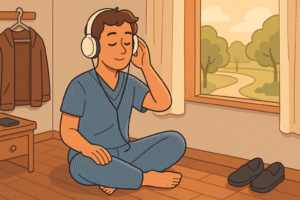
The Importance of Community Abroad
Isolation is one of the biggest threats to mental health overseas.
When I first arrived, I made the mistake of keeping to myself. It felt easier than trying to connect across cultures. But that only deepened the exhaustion.
Joining a local sports group, attending community dinners, or simply saying yes to a coffee invitation from a colleague can make all the difference.
Shared meals and laughter—even with people from different backgrounds—act as emotional buffers.
If you’re in a smaller island or rural post, online communities for foreign doctors can help bridge that gap.
Professional networks like the National Academy of Medicine’s Well-Being Plan and local expat Facebook groups often share practical tips and mental-health support resources.

How to Spot Burnout Early
You don’t have to wait until you’re emotionally drained to act.
Look for these early signs of burnout:
-
You start dreading work even after rest days.
-
You stop finding meaning in patient care.
-
You rely more on caffeine, social media, or isolation to “cope.”
If these sound familiar, it’s time to reset.
Talk to a trusted colleague, reach out to occupational health services, or even schedule an online mental-health consultation through telemedicine providers or employee assistance programs.
Remember: seeking help doesn’t make you weak—it means you’re taking responsibility for your wellbeing, just like you do for your patients.
Final Thoughts
Being a doctor abroad is one of the most rewarding yet emotionally demanding experiences you’ll ever face.
Burnout isn’t inevitable—but balance must be intentional.
Start small: call a friend, walk after your shift, keep a gratitude note. These daily acts quietly build resilience and joy.
Because no matter where you practice, the best care starts with a healthy doctor.
If you enjoyed this reflection, read my earlier post The Fastest Lesson I Learned Abroad — a short story about adapting to new hospital cultures and self-care lessons learned on the job.
